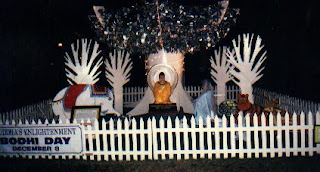
It seems that the holidays start earlier each year. Why, just before Halloween I saw the first Christmas commercials magically appear on television and my local drugstore has been selling Christmas decorations since September. The barrage of holiday commercialism can be enough to turn even the most fervent holiday celebrant into a Grinch and it can make it difficult for people to appreciate why we celebrate in the first place.
In the Montessori environment, celebrating holidays and festivals is an important and exciting study for the students that focuses on the tradition and rituals of celebrations.
Cultural Celebrations in the Montessori Environment - Winter Holidays from Around the World!
Teachers provide students with long lasting impressionistic lessons that reinforce the idea that people around the world have distinctive yet similar celebrations. Students retain the joy of holiday celebrations as they learn about a variety of cultural observances. Learning about the holidays of different cultures embraces the Montessori principals of inclusion and peace and helps students understand that celebrations have had a great significance to people throughout time and across all cultures. Holidays are a way that people come together to worship that which they hold dear, to rejoice, and usually to feast with their community and families. The message is clear: it is wonderful to be different and honor what is unique about each culture and person, but let us celebrate our humanity together.
.jpg)
A number of holidays begin with the arrival of winter. As the days grow shorter and nights grow longer, many cultures celebrate light. Samhain, the first day of winter in the Celtic calendar, is celebrated from sunset on October 31 to sunset on November 1 and is symbolized by the lighting of bonfires on hilltops. Diwali, the Hindu festival of lights, celebrates the victory of good versus evil. And Dia de los Meurtos traces its origins to the Aztec celebration Catrina, the goddess of the dead. November first issues Calan Gaeaf, the Welsh first day of winter, and December welcomes a number of significant celebrations, including Chanukah, Christmas, and New Year’s.
To create an atmosphere of multicultural inclusion, your Montessori environment may choose to focus on holidays that may be less well known, such as:
- December 8 – Bodhi Day, or Day of Enlightenment, celebrating the day that Buddha experienced enlightenment
- December 21 – Dōngzhì, or Chinese Winter Solstice Festival
- December 21 – Yalda, an Iranian winter solstice festival celebrating the victory of goodness and light over evil and darkness
- December 21-25 – Pancah Ganapati, a five day Hindu celebration honoring Lord Ganesha, patron of arts and culture
For adults, it is easy to become stressed and cynical over the commercialism of holiday celebrations. Let’s help our children develop healthy behaviors and attitudes toward the holidays by giving them the opportunity to experience the peace and light that is cherished by all cultures.
As much as possible, NAMC’s web blog reflects the Montessori curriculum as provided in its teacher training programs. We realize and respect that Montessori schools are unique and may vary their schedules and offerings in accordance with the needs of their individual communities. We hope that our readers will find our articles useful and inspiring as a contribution to the global Montessori community.
© North American Montessori Center - originally posted in its entirety at Montessori Teacher Training on Friday, November 8, 2013.
© North American Montessori Center - originally posted in its entirety at Montessori Teacher Training on Friday, November 8, 2013.




This is a useful piece. Thank you for providing a range of different holidays that teachers can introduce to students. It would also be a fun project for children to explore the common themes as well as differences of these various celebrations.
ReplyDelete